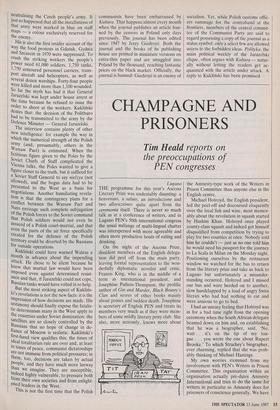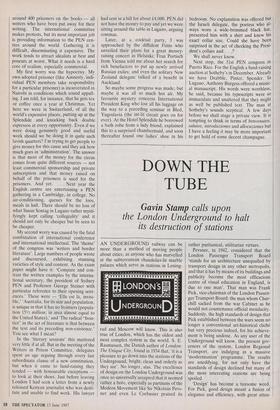CHAMPAGNE AND PRISONERS
Tim Heald reports on
the preoccupations of PEN congresses
Lugano THE programme for this year's Ascona Literary Prize was undeniably daunting: a benvenuto, a saluto, an introduzione and two allocuziones quite apart from the ceremonia itself. There is never so much talk as at a conference of writers, and in Lugano PEN's 50th international congress the usual melange of multi-lingual chatter was interspersed with more agreeable and often more productive bouts of eating and drinking.
On the night of the Ascona Prize, dissident members of the English delega- tion did peel off from the main party, leaving formal representation to the won- derfully diplomatic novelist and critic, Francis King, who is in the middle of a term as international president, and Josephine Pullein-Thompson, the prolific author of Gin and Murder, Black Beauty's Clan and scores of other books mainly about ponies and sudden death. Josephine is secretary .of English PEN and treats its members very much as if they were mem- bers of some mildly literary pony club. She also, more seriously, knows more about
the Amnesty-type work of the Writers in Prison Committee than anyone else in the English centre.
Michael Holroyd, the English president, led the peel-off and discoursed eloquently over the local fish and wine, most memor- ably about the revolution in squash started by Hashim Khan. Holroyd once played county-class squash and indeed got himself disqualified from competition by trying to play for two counties at once. Nobody told him he couldn't — just as no one told him he would need his passport for the journey to La Scala in Milan on the Monday night. Positioning ourselves by the restaurant window we watched for the bus to return from the literary prize and take us back to Lugano but unfortunately a misunder- standing occurred. Holroyd and I missed our bus and were herded on to another, slow handclapped by a load of angry Swiss literati who had had nothing to eat and were anxious to go to bed.
I had an uneasy feeling that Holroyd was in for a bad time right from the opening ceremony when the South African delegate beamed down on him and, on establishing that he was a biographer, said, 'No, wait . . . it's on the tip of my ton- gue . . . you wrote the one about Rupert Brooke.' To which Strachey's biographer, ever charming, replied that she was prob- ably thinking of Michael Hastings.
My own worries stemmed from my involvement with PEN's Writers in Prison Committee. This organisation within an organisation actually pre-dates Amnesty International and tries to do the same for writers in particular as Amnesty does for prisoners of conscience generally. We have around 400 prisoners on the books — all writers who have been put away for their writing. The international committee makes protests, but its most important job is providing information to the PEN cen- tres around the world. Gathering it is difficult, disseminating it expensive. The work tends to attract idealists at best and poseurs at worst. What it needs is a hard core of realism, especially commercial.
My first worry was the hypocrisy. My own adopted prisoner (like Amnesty, indi- vidual PEN members take responsibility for a particular prisoner) is incarcerated in Nairobi in conditions which sound appall- ing. I am told, for instance, that he gets tea or coffee once a year at Christmas. Yet here we were in Switzerland, of all the world's expensive places, putting up at the Splendide and knocking back double espressos at every opportunity. Even if we were doing genuinely good and useful work should we be doing it in quite such lavish quarters? I'm trying to get people to give money for this cause and they ask how much goes in 'administration'. The answer is that most of the money for the circus comes from quite different sources — not least commercial sponsorship and private subscription and that money raised on behalf of the prisoners is used for the prisoners. And yet. . . . Next year the English centre are entertaining a PEN gathering in a Cambridge, in college. No air-conditioning, queues for the loos, meals in hall. There should be no loss of what Susan Sontag in Lugano rather mysti- fyingly kept calling 'collegiality' and it should not only be cheaper but be seen to be cheaper.
My second worry was caused by the fatal combination of international conference and international intellectual. The `theme' of the congress was 'writers and border literature'. Large numbers of people wrote and discoursed, exhibiting stunning varieties of style and content. As the exam paper might have it: 'Compare and con- trast the written examples by the interna- tional secretary, the president of Sydney PEN and Professor George Steiner with particular reference to their opening sent- ences.' These were — 'Elle est la, invisi- ble ,"Australia, for its size and population, is unique in that it has no frontiers (popula- tion 151/2 million; in area almost equal to the United States),' and 'The radical "fron- tier" in the act of literature is that between the text and its preceding non-existence.' You see what I mean?
In the 'literary sessions' this mattered very little if at all. But in the meeting of the Writers in Prison Committee, delegates spent an age arguing through every last subordinate clause of a new constitution, but when it came to fund-raising they tended — with honourable exceptions to look at their shoes. Just before leaving London I had seen a letter from a newly released Kenyan journalist who was desti- tute and unable to find work. His lawyer had sent in a bill for about £4,000. PEN did not have the money to pay and yet we were sitting around the table in Lugano, arguing commas.
Later, at a cocktail party, I was approached by the diffident Finns who unveiled their plans for a great money- raising concert in Helsinki; Frau Portisch from Vienna told me about her search for rich benefactors to put up newly arrived Russian exiles; and even the solitary New Zealand delegate talked of a benefit in Auckland.
So maybe some progress was made; but maybe it was all so much hot air. My favourite mystery concerns International President King who lost all his luggage on the way to a preceding seminar in Bled, Yugoslavia (the int-lit circuit goes on for ever). At the Hotel Splendide he borrowed a bath robe from a lady friend, explained this to a surprised chambermaid, and soon thereafter found one ladies' shoe in his bedroom. No explanation was offered but the Israeli delegate, the poetess who al- ways wore a wide-brimmed black hat, presented him with a shirt and knew his exact collar size. Could she have been surprised in the act of checking the Presi- dent's collars and . .?
We shall never know.
Next stop, the 51st PEN congress in Puerto Rico. For the English a fund-raising auction at Sotheby's in December. Already we have Drabble, Pinter, Spender. In Lugano, Anthony Burgess offered a music- al manuscript. His words were worthless, he said, because his typescripts were so immaculate and unaltered that they might as well be published text. The man at Sotheby's sounds sceptical. A few days before we shall stage a private view. It is tempting to think in terms of benvenutos, salutos, introduziones and allocuziones but I have a feeling it may be more important to get hold of some decent champagne.




























































 Previous page
Previous page